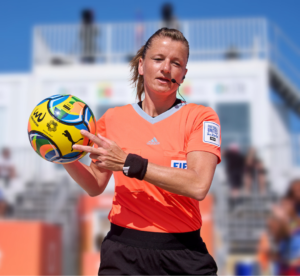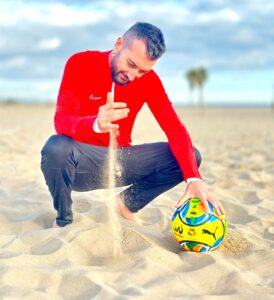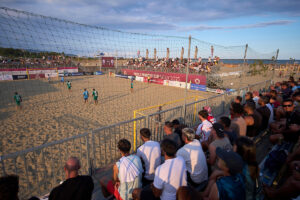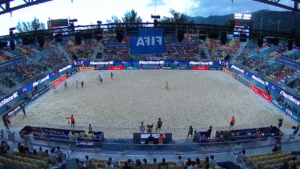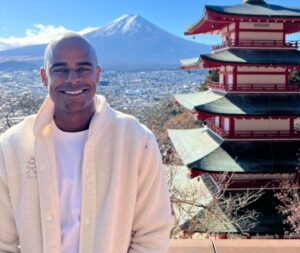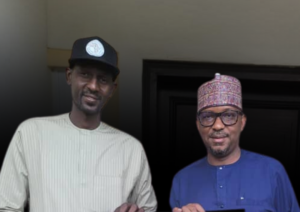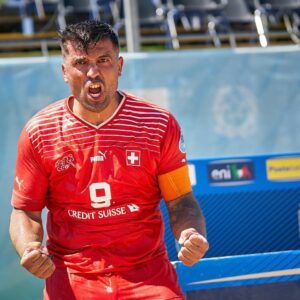Madsen discusses his meteoric rise to the top and award, his sub-zero training in the snow and Denmark’s quest to reach the FIFA Beach Soccer World Cup.

- Gustav Madsen only started playing beach soccer a few years ago
- The 22-year-old is already one of the world’s best goalkeepers
- He tells his engrossing story and discusses Denmark’s emergence
“What on earth have I signed up for?” wondered Gustav. COVID-19 had left the 18-year-old mind-numbingly bored and out of shape. He could no longer go to school, waiter at a restaurant, or play 11-a-side. Then his buddy Carlos threw him an invite that rocked his world. It was to do some beach soccer training. Gustav hit Google and spent the next 10 minutes watching the Martins twins thrill on Nazare Beach, Rodrigo pummel home bicycle kicks on the Copacabana and, to his personal pleasure, goalkeepers actively play-make and unleash shots on scenic sands. “This looks a lot of fun,” he thought. The Dane’s mindset nevertheless shifted when he got to training. “It was freaking freezing,” he recalled. “Even in these neoprene socks I was thinking, ‘What the hell am I doing here?” Madsen was additionally alarmed at seeing someone running around barefoot in sub-zero temperatures like some Viking madman. His doubts immediately dissipated once the action got under way.
Gustav Madsen and beach soccer, indeed, was love at first sight. Astonishingly, in merely three-and-a-half years, the Copenhagener has established himself as one of the best players of his position on the planet, and in February became the first goalkeeper to seize the prestigious Rising Star award at the Beach Soccer Stars Gala held in Dubai.
Gustav required a few days off from studying for a bachelor’s degree in economics and working in a pension firm to go to and collect it in Dubai, and 15 minutes away from the latter to tell FIFA about his meteoric explosion on to the scene. With any luck, he’ll be begging his boss for a couple of weeks off, and missing a few matches for an 11-a-side team in the Danish sixth flight, in May 2025. Madsen wants to be a far climatic cry away from the “wind, rain and snow” of the Baltic Sea coastline. He is desperate to be playing on the powder-soft white sand by the crystal-clear turquoise waters of the Seychelles, representing Denmark in the FIFA Beach Soccer World Cup™.
FIFA: You haven’t played beach soccer for long, right?
Gustav Madsen: I started playing three-and-a-half, four years ago during COVID-19. You couldn’t practice normal football, because you couldn’t have more than five people together. I wanted to maintain my form. One of my mates, Carlos [Wegeberg], who also plays for the national team, said beach soccer was an amazing way to do it. I got really attached to beach soccer right away. I’ve always been a goalkeeper who loved playing with my feet. I saw all the technical stuff you can do and that, being a goalkeeper, you get the ball a lot. I just loved that. I’ve always loved shooting too. You don’t get to do it as a goalkeeper in 11-a-side, but it fits in perfectly with beach soccer.
– How did you become so good so quickly?
– Through a lot of practice. Even when it’s sub-zero degrees, we train. The Danish season runs from May till late September, but we train all year round. Even when it’s bad weather, which is 50 per cent of the time in Denmark, we still go to practice. When you train where there’s a lot of wind, and go to play where there isn’t, it makes a huge difference. The control, touches are completely different. When it gets to April, it’s easier to train. From November until late March, it’s rainy, windy, freezing. We have to train in neoprene socks to keep our feet from freezing, but the feeling of the ball is not the same. When you play without socks, it’s like a different sport. There’s only one of us who trains barefoot in the winter.

– Is that Henrik Raekjaer by any chance?
– (laughs) He won season two of Korpset. It’s a TV programme where contestants have to go through the toughest things you do in the military. He’s a tough, tough man. I don’t know if you’ve ever tried playing on sand when it’s two degrees, but he does it. Believe me, it’s freaking cold. The rest of us wouldn’t even dream of doing it!
– How did you feel last April when the legendary Llorenc Gomez was announced as Denmark coach, and had you seen much of him as a player?
– To be honest, because I hadn’t played beach soccer for that long, I knew who he was, but I didn’t realise just how good he was. Now I know what a legend he was. Getting Llorenc was huge for Denmark. I didn’t know how aggressive he would be. He was exceptionally motivating and inspiring. We became much more disciplined. He loves beach soccer and is very passionate. He brought a lot of new ideas. He taught us how to play beautiful beach soccer. Having him was amazing. Terry [Bowes], who was the assistant coach under Llorenc, also improved us a lot and now he’s our head coach.

– In qualification for the last FIFA Beach Soccer World Cup, Denmark beat global giants Switzerland, qualified from the group and then got a really tough draw in the play-offs. What did you think of that campaign?
– That was the start of showing what the Denmark beach soccer national team can do. We knew how good we were, but we played in the B Division and I don’t think the A Division teams realised what level we were on. Before we played against Switzerland, we said, ‘This is our time to show what we can do against the best sides.’ We went out and beat Switzerland, which was amazing. Llorenc told us, ‘You don’t win games in the first two periods. You win them in the last period.’ That’s what we did. We were 2-0 down after two periods. We kept cool, kept playing our way, and won 3-2. Belarus are really, really good. They don’t stop running. Their physicality is unbelievable. We beat Turkey and reached the play-offs, and unfortunately got a really tough draw in Portugal. We didn’t reach the World Cup, but we showed that Denmark are a force to be reckoned with.

– You were outstanding at the last Euro Beach Soccer League. How pleased were you with Denmark’s performances in that tournament?
– It was amazing. It was the first time we played in the Euro Beach Soccer League. We had a tough game against Portugal, but we always knew the key games would be against Estonia and France. As I told you, Llorenc kept drilling it into us that you win games in the last period, so even though we were losing in both those games, we knew if we kept pushing and pushing we could win. Our playing style goes a lot through me, and we also have some players who are really good at bicycle kicks. We have a lot of systems to play. It was an unbelievable tournament for us.
– Denmark won two games on penalties. You’ve got an excellent record in shootouts..
– I’ve always loved penalties. I don’t think there’s any pressure on a goalkeeper. I wouldn’t expect a goalkeeper to save three or four penalties. Some say, ‘You have to save one’, but personally I feel no pressure. My goalkeeping partner Oliver [Levin] feels the same. We switch goalkeepers a lot during penalty shootouts. Psychologically, I also think it puts your opponents off. When it goes to penalties, me and Oliver are really confident.
– How did it feel to win the Rising Star award at the Beach Soccer Stars Gala in Dubai in February?
– Wow! Unbelievable. I loved every second of it. I travelled on my own. When I got to the ceremony, I saw all the Portuguese players together, all the Spanish players together, the same with the Japanese, Senegalese, Brazilian players. I was thinking, ‘I come from a place where it snows. What am I doing here!?’ (laughs). I didn’t know where to stand. Fortunately, Llorenc was there and he made me feel more comfortable. When they announced my name as the winner I was overwhelmed. It’s hard to describe the emotions. When I was up on the stage and you had Ozu [Moreira], Bruno Xavier, [Leandro] Casapieri, Be Martins, I was like, ‘What on earth is going on!?’ I think it only really sunk in when I got back to Denmark. A lot of people in Denmark don’t know what beach soccer is, but I had everyone asking about it. I’ve had setbacks, I’ve had people who didn’t believe in me. It shows that if you’re passionate about something and work really, really hard, you can get very far. My family were really, really proud. I got a big hug from my dad, my mum and my sister.

– The Rising Star award has been won by all three finalists for the Best Player 2023 award, Rodrigo, Be Martins and Noel Ott, as well as Josep Jr, Luca Bertacca. How does it feel to be in such elite company?
– I have a lot of expectations to live up to! Seriously, though, I don’t feel pressure. I used to get really nervous playing 11-a-side, but in beach soccer I’m relaxed every time I touch the ball. Being in that elite company, it makes me want to get even better. I was the first goalkeeper to win the award. More people now know who I am. I think it will make things more difficult for me. I don’t think I’ll get a lot of the chances I got last year. So I’ll have to change, and as a team we’ll have to change our playing style a little bit to have other options to attack.
– You’re already one of the best goalkeepers in the world with your feet. How did you become so good at playmaking and scoring goals?
– From my point of view, the most important thing is being aware of what’s happening around you when you’re juggling the ball. When I’m juggling on my right knee, I have to know if there’s a guy coming at me from my left or if they’re rotating. That’s really, really important. The goal I scored against Portugal, I knew that Bernardo Lopes had just run a lot and would be a little bit tired. I saw there was space to run into and went for it quickly. When he’s fresh, maybe I’m not as quick as him, but when he’s tired, I can run a little bit faster. So I think to be an attacking goalkeeper, you need to have good control but to also have good awareness of what’s going on around you.
– What did you think of UAE 2024 Dubai?
– An amazing event. I watched nearly every game. Four of us on the national team, we got together on the Saturday and Sunday to watch the semi-finals and the final. Man, I can’t even describe how much it made us want to be at the World Cup one day. We didn’t stop talking about that. In terms of that World Cup, we saw some incredible games, some brilliant goals and, for me, it was nice to see goalkeepers having such an impact.
– Which goalkeeper impressed you the most?
– I think that’s an easy answer: Seyed [Mirjalili] from Iran. I’ve watched the goal where he juggles it seven or eight times and flicks the ball over his own head over 50 times! I love the way Iran play. Seyed and Hamid [Behzadpour], those two were amazing.
– Who would you say is the best goalkeeper in the world right now?
– This one’s really difficult to answer. I think goalkeeping has two parts: making saves and being a playmaker. At defending the goal, there’s no doubt that it’s Casapieri. His reflexes are incredible. With the feet, I’d say Eliott [Mounoud] or Bobo. Eliott is more aggressive than Bobo, but Bobo is really calm on the ball. I think Bobo should be more aggressive because he’s really good on the ball.

– You mentioned being desperate to play at the World Cup. Do you think Denmark can make it to Seychelles 2025?
– A lot depends on the draw. In qualification for the last World Cup we got through our groups but then got Portugal in the play-offs, which makes it really tough. If we play how we can, we have a good chance. It would also be really nice, coming from the rain and the snow, to play in a country like the Seychelles. But we face a lot of difficulties that others teams don’t. We’re one of the only national teams in the world who don’t get supported by the federation. We pay for everything ourselves. We book our own hotels. We cook our own food. It was quite expensive going to Azerbaijan. We had to sleep in Rome Airport. We were there for 13, 14 hours. We ordered taxis to take us from the hotel to the stadium. It’s difficult. You have a lot of hassle. Our captain Casper [Dorph] arranges everything. I can’t tell you what he means to Danish beach soccer. Casper Dorph is Danish beach soccer. We’re all very grateful to him.
– Can you tell us where your love of West Ham United comes from?
– My godfather has been a West Ham fan for most of his life. He got me into the culture. I’m a massive fan. I’ve been to London to watch the games. West Ham reminds me of what hard work can get you. It’s not a club like Manchester City, Chelsea or Arsenal with all this money. West Ham are a hard-working club. The Boleyn Ground, Upton Park, where they used to play, is in a neighbourhood full of good, hard-working families. When I went to London with my godfather and my dad, we went to an event for West Ham fans. Immediately the people – lovely people – started talking to us. ‘Ah, you’re from Denmark, how nice’. It’s the West Ham way. I loved Dmitri Payet and was a fan of big Andy [Carroll]. I really like Michail Antonio too.
Credits: FIFA


